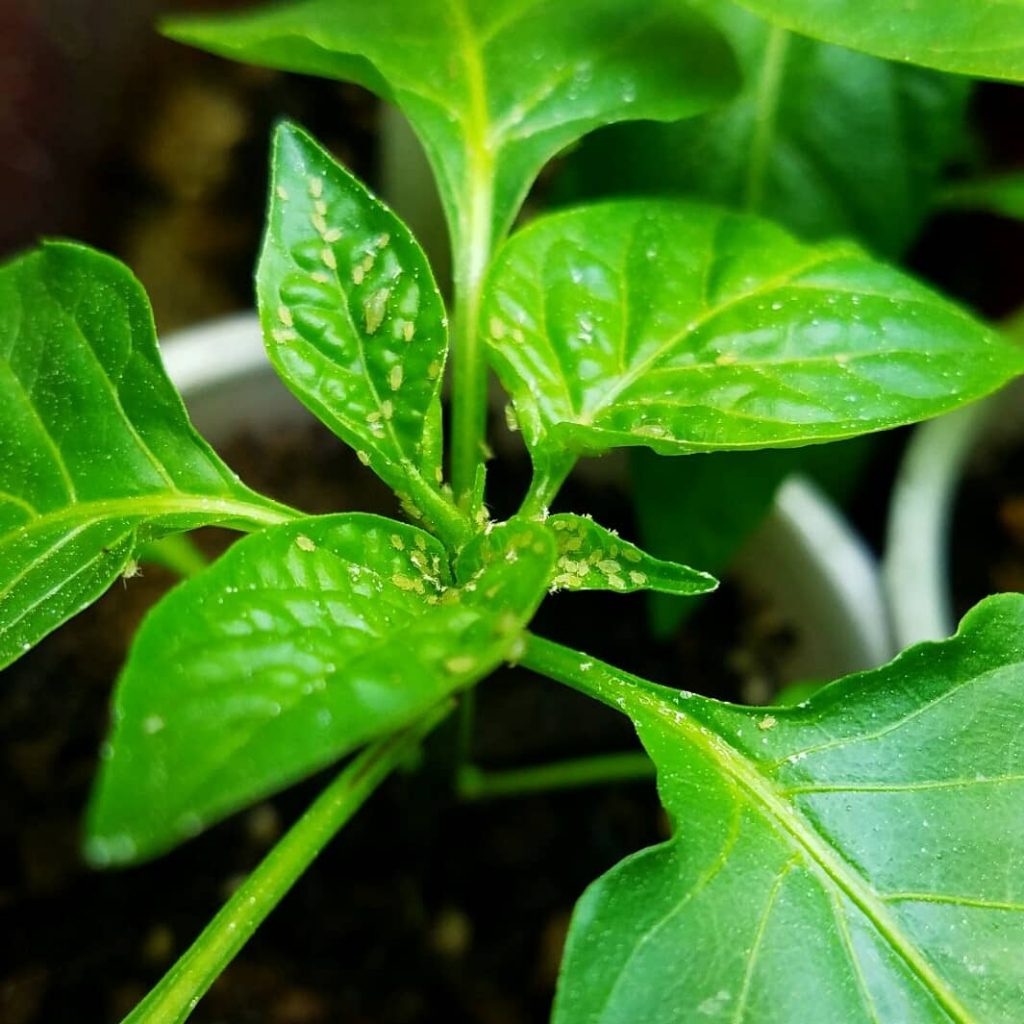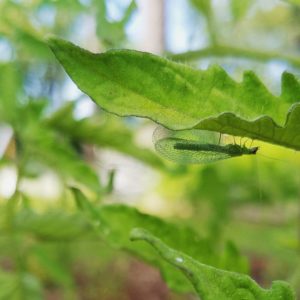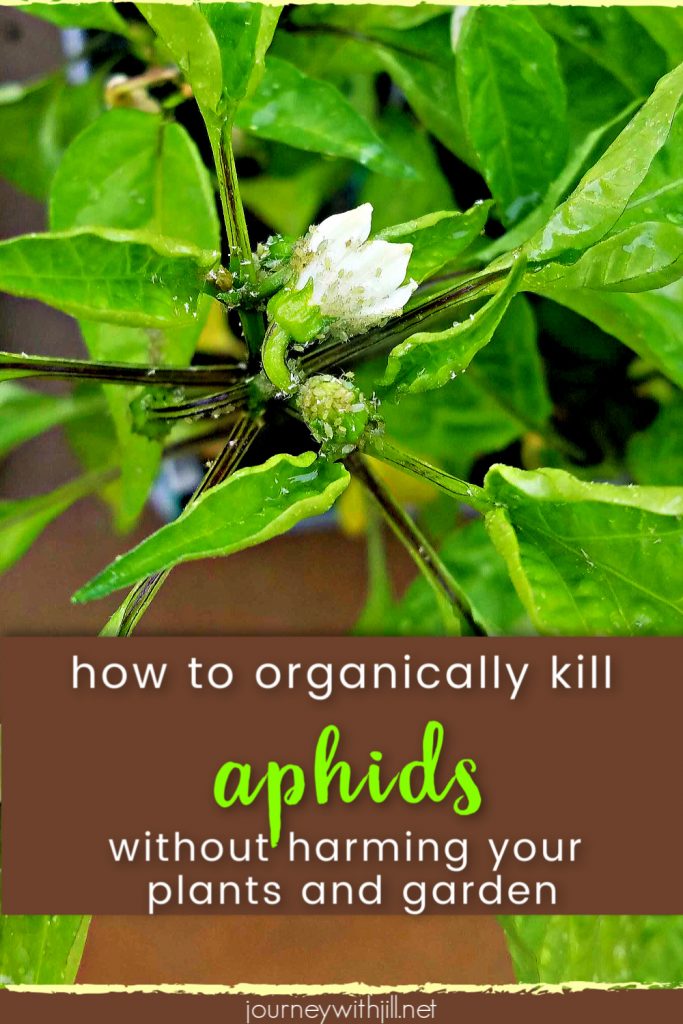How to Control Aphids Naturally and Effectively
Dare I admit it? I didn’t know what aphids were until my fourth gardening season. Maybe I got lucky? Or more likely, maybe I just didn’t know I had them.
Once I learned to identify aphids. I realized most gardeners deal with this common pest season after season. For those of us who strive to garden naturally, this presents a problem. How do we control aphids effectively without resorting to chemical pesticides?
In this episode of the Beginner’s Garden Podcast, we discuss the organic ways a natural home gardener can approach this common pest. Click below to listen or continue reading.
How to Identify Aphids on Plants
Aphids are small, soft-bodied insects. Less than 3 millimeters long, you have to get close to your plants to see them. Coming in a variety of colors — beige, green, yellow, black, or even shades of red — you can find them in groups in leaf crevices, most noticeably on young leaves.

Another telltale signs that you have aphids is the presence of ants. If you see ants on plants, keep looking because it’s likely aphids aren’t far behind.
VIDEO: Ants on your plants can point to an aphid infestation: Ants on Your Plants?
How Do Aphids Affect Plants?
Aphids suck on the plant’s juices, which results over time in decreased growth. You may also notice the leaves growing mottled. Left unchecked, aphid feeding will lead to mottled, yellow, and browning leaves, eventually resulting in death of the leaves and in extreme cases, death of the plant.
Aphids can also spread diseases from plant to plant.
Is it Necessary to Get Rid of Aphids in the Garden?
Known as the “salad bar of the insect world,” aphids provide food for beneficial insects in your garden. Ladybugs, lacewings, and syrphid flies — which also control other pests in the garden — find rich food in aphid buffets.

Even common organic aphid control methods like insecticidal soap, neem oil, or diatomaceous earth will kill the larvae of these beneficial insects along with aphids.
Just because it’s an organic method does not mean it’s good for your garden or the ecosystem. Many organic controls kill off or repel the beneficial insects we need, which will only perpetuate a cycle of needing more and more intervention.
In my years of gardening, I have never had to use any organic pesticide to control aphids in my garden.
By limiting my overall pest intervention, my garden teems with beneficial insects and the aphids that do arrive have never gained control over my plants. In fact, I believe they have attracted good insects to my garden, creating a well-rounded, natural, beneficial ecosystem.
What Kills Aphids?
That said, if your garden doesn’t have this beneficial insect ecosystem in place yet, you may have to choose between losing your plant and temporarily intervening with an organic control. Here are some methods, starting with the least impactful to the environment to the most. I recommend starting with the top ones first.
Clip affected stems. If you can catch the aphid infestation early, clip off the stems that are the most affected. Crush others with your fingers.
Use a high pressure water spray to dislodge the aphids and knock them to the ground. A slight stream of water won’t work, so your plants need to be strong enough to withstand the stream of spray.
Insecticidal soap. Apply either an organic blend, or a carefully-blended homemade mix. Spray directly on the aphids, being sure to get the underside of the leaves, too. Repeat one week later if necessary.
Caution! This spray can cause leaves to burn so test first. Younger, thinner leaves are more likely to curl with damage. Also, this spray will kill ladybug larvae, so ensure they aren’t present. If they are, don’t spray! They’re eating your aphids!
Neem oil. An organic pesticide, neem oil will kill aphids but not beneficial insects. However, they will repel them, so use this only as necessary.
How to Prevent Aphids
The best way to control aphids is to prevent them from becoming a problem that your plants cannot handle.
Focus on healthy plants. Most healthy plants can tolerate some aphid damage, at least until their predators show up. Feed your soil with compost and rich organic material.

Plant flowers that attract beneficial insects to your garden. Daisies, sunflowers, wildflowers, bee balm, yarrow, and any other flowers with small clusters attract a plethora of aphid-eating insects.
Promote a diverse garden. With plenty of variety between vegetables, fruits, herbs, and flowers, pests will be less likely to overtake your plants. See companion planting for pest control.
Conclusion
The best way to prevent aphids from damaging and killing plants is to see the garden as a whole and create the healthiest, most organic ecosystem in your home garden. But while you’re working on that, or if aphids threaten to get control, these organic pest control methods can help keep the damage at a minimum.
Do you get overwhelmed with garden planning?

Subscribe here for my best tips to plan your garden in just 7 days -- all for FREE.
Plus, I'll send you my "In the Garden E-mail" on Fridays, periodic updates on garden resources relevant to you, and you'll receive access to my entire bank of free garden downloads!
You are also agreeing to our privacy policy.


What about nurseries / greenhouses that sell ladybugs? A great way to introduce them to my area or a waste of money? (Denver, zone 6)
I’ve heard mixed opinions on that, but if it were me and I had no ladybugs at all, I would try it. But first, I think I’d work on creating a garden area where ladybugs would want to come — beneficial plants, no pesticides, etc. I’d plant the plants that ladybugs are attracted to. For me, I’m always finding them on my carrots and on my lettuce and arugula. But again, if you have none in the area, I don’t think it would be a bad idea to buy some to get your population started.
I always plant some sweet Basil amongst my garden plants especially the tomatoes. Years earlier I used to have a time with them until a fellow gardener led me onto this idea of his. Since then Ive never been bothered with the aphids. I remember one year that I did not plant the Basil and had a terrible time with the aphids.